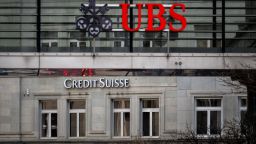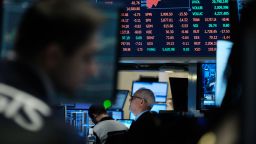European markets ticked up Monday but bank stocks were mixed and volatile as investors assessed the significance of the near-collapse of Credit Suisse, one of the world’s most important financial institutions.
Europe’s benchmark Stoxx Europe 600 index was up 1%, while Germany’s DAX (DAX) and France’s CAC 40 (CAC40) rose 1% and 1.4% respectively, recovering from losses earlier in the day. London’s bank-heavy FTSE 100 (UKX) was 0.8% higher.
The Stoxx Europe 600 Banks index, which tracks 42 big EU and UK banks, was 0.9% up. On Sunday, UBS (UBS) agreed to take over rival Credit Suisse (CS) in an emergency rescue deal. That was followed a few hours later by a coordinated move by major central banks to boost the flow of US dollars through financial markets.
“So far it looks as though those efforts have not been in vain, along with those of a selection of major central banks to ensure access to dollar funding continues,” said Craig Erlam, senior UK and European market analyst at OANDA.
“This is now the second weekend that central banks, governments, and regulators have spent putting out fires, and, while markets are recovering today, I’m not sure anyone is confident that all flames have been extinguished.”
Swiss-listed shares in UBS rose 2% Monday afternoon. Earlier in the session the stock had fallen as much as 15%, along with a broader fall in the European banking sector.
Credit Suisse shares were 56% in the red, broadly in line with the value of the $3.25 billion offer from UBS. Deutsche Bank (DB) and Societe Generale (SCGLF)shares slipped, while other big European lenders strengthened.
In Asia, HSBC and Standard Chartered slumped in Hong Kong trading. Both stocks also fell in London.
The Credit Suisse deal was aimed at stemming market panic unleashed by the failure of two US banks earlier this month. But investors were unnerved by the losses imposed on owners of $17 billion worth of Credit Suisse “alternative tier one” (AT1) bonds as one of the conditions of the rescue.
David Benamou, chief investment officer at Axiom Alternative Investments, a French wealth management firm with exposure to AT1 bonds called the decision “quite surprising, not to say … shocking.”
In the United States, the S&P 500 index inched up 0.8%. Meanwhile, the KBW Bank Index, which tracks 24 leading US banks, rose 2.9%.
In Hong Kong, the Hang Seng Index (HSI) closed 2.7% lower. HSBC (HSBC) led index losses, shedding 6.2%. Standard Chartered (SCBFF) shares in the city fell 7.3%. Both lenders are headquartered in London, but make most of their money in Asia.
By market close, China’s Shanghai Composite was 0.5% down, Japan’s Nikkei (N225) 1.4% lower and South Korea’s Kospi lost 0.7%. The S&P/ASX 200 in Australia decreased by 1.4%.
Credit Suisse rescued
UBS agreed to pay 3 billion Swiss francs ($3.25 billion) for Credit Suisse, about 60% less than the amount the bank was worth when markets closed on Friday.
The Swiss National Bank said in a statement that the agreement would “secure financial stability and protect the Swiss economy.” Credit Suisse is one of 30 banks that are particularly important to the global financial system.
Just hours after the deal was announced, the Fed and several other major central banks announced a coordinated effort to boost liquidity in the global financial system with the aim of keeping credit flowing to households and businesses.
According to Stephen Innes, managing partner of SPI Asset Management, HSBC and Standard Chartered were facing greater scrutiny Monday as two banks that, similarly to Credit Suisse, have had “had their share of ups and downs.”
For Standard Chartered, recent speculation that the lender was a “takeover target” may be weighing on the stock, he said. Standard Chartered’s CEO told CNBC last month that the bank was “absolutely not” for sale.
HSBC, meanwhile, could be subject to investor jitters after buying the UK arm of Silicon Valley Bank, the lender that collapsed earlier this month, Innes said.
Calming nerves
On Monday, Hong Kong’s de facto central bank and securities regulator joined the chorus of central banks in welcoming the announcement from Zurich and sought to reassure the public that business would continue as usual.
“The exposures of the local banking sector to Credit Suisse are insignificant,” the Hong Kong Monetary Authority (HKMA) said in a statement, adding that the assets of Credit Suisse’s local branch were worth approximately 100 billion Hong Kong dollars ($12.7 billion) or “less than 0.5% of the total assets of the Hong Kong banking sector.”
The lender’s customers in the city will be able to “continue to access their deposits with the branch and trading services” as normal, the HKMA added. “Their overall exposures to the Hong Kong market are not significant.”
In Australia, Christopher Kent, the assistant governor of financial markets at the Reserve Bank of Australia (RBA), also weighed in, noting the recent strain on investors.
“Volatility in Australian financial markets has picked up,” he told a conference Monday. “But markets are still functioning and, most importantly, Australian banks are unquestionably strong — the banks’ capital and liquidity positions are well above [regulators’] requirements.”
Assurances from Singapore, the Philippines
Similarly, the Monetary Authority of Singapore (MAS) said Monday that Credit Suisse, which has operated in the city since 1973, would continue serving customers “with no interruptions or restrictions, following the announced takeover.”
“Customers of CS will continue to have full access to their accounts,” it said in a statement, noting that the Swiss lender primarily catered to private banking and investment banking clients, not retail customers, in the city state.
“The takeover is not expected to have an impact on the stability of Singapore’s banking system,” it added.
The Philippines, too, moved to assuage fears.
On Friday, the country’s central bank declared that “?the Philippine banking system remains safe and sound.”
“We have shown our resilience through the pandemic, and we continue to be strong in the face of the ongoing turbulence in the global markets,” it said in a statement.
— Mark Thompson, Juliana Liu and Anna Cooban contributed to this report.







